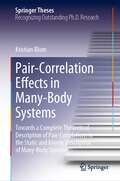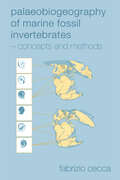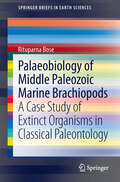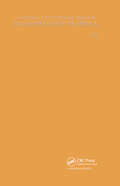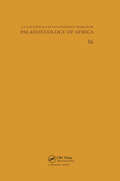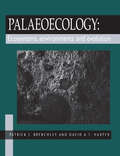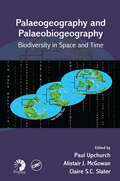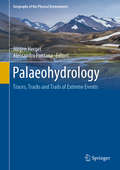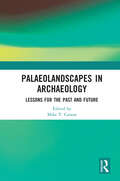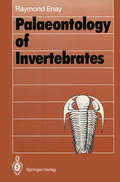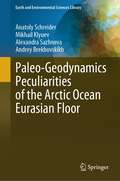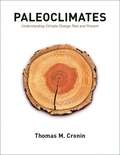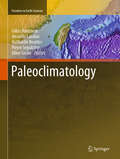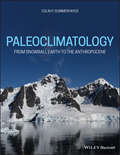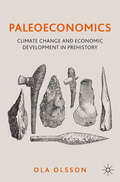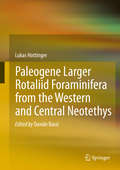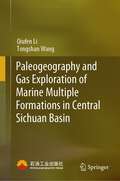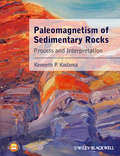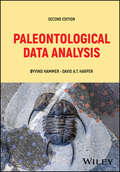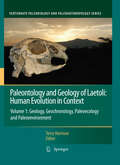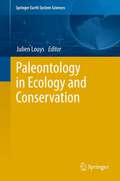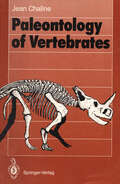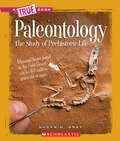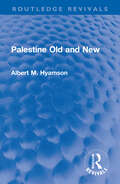- Table View
- List View
Pair-Correlation Effects in Many-Body Systems: Towards a Complete Theoretical Description of Pair-Correlations in the Static and Kinetic Description of Many-Body Systems (Springer Theses)
by Kristian BlomThe laws of nature encompass the small, the large, the few, and the many. In this book, we are concerned with classical (i.e., not quantum) many-body systems, which refers to any microscopic or macroscopic system that contains a large number of interacting entities. The nearest-neighbor Ising model, originally developed in 1920 by Wilhelm Lenz, forms a cornerstone in our theoretical understanding of collective effects in classical many-body systems and is to date a paradigm in statistical physics. Despite its elegant and simplistic description, exact analytical results in dimensions equal and larger than two are difficult to obtain. Therefore, much work has been done to construct methods that allow for approximate, yet accurate, analytical solutions. One of these methods is the Bethe-Guggenheim approximation, originally developed independently by Hans Bethe and Edward Guggenheim in 1935. This approximation goes beyond the well-known mean field approximation and explicitly accounts for pair correlations between the spins in the Ising model. In this book, we embark on a journey to exploit the full capacity of the Bethe-Guggenheim approximation, in non-uniform and non-equilibrium settings. Throughout we unveil the non-trivial and a priori non-intuitive effects of pair correlations in the classical nearest-neighbor Ising model, which are taken into account in the Bethe-Guggenheim approximation and neglected in the mean field approximation.
Palaeobiogeography of Marine Fossil Invertebrates: Concepts and Methods
by Fabrizio CeccaSitting squarely at the interface between earth and life sciences, palaeobiogeographic information is scattered throughout many publications. Until now. Palaeobiogeography of Marine Fossil Invertebrates covers important theoretical concepts relating to palaeobiogeography together with descriptions of analytical methods. Fabrizio Cecca discusses general biogeographical concepts and the factors influencing distributional patterns using illustrative case histories. Cecca uses the palaeobiogeography of fossil organisms to generate hypotheses on continental drifting, past migration routes, palaeobiodiversity gradients, geographic barriers, palaeoclimatic and paleooceanographic conditions. He explores the biogeographical dimension of biodiversity through the analysis of existing latitudinal and longitudinal gradients of biodiversity and discusses the biodiversity/area relationship with particular reference to sea-level variations.
Palaeobiology of Middle Paleozoic Marine Brachiopods
by Rituparna BoseFossil species appear to persist morphologically unchanged for long intervals of geologic time, punctuated by short bursts of rapid change as explained by the Ecological Evolutionary Units (EEUs). Here, morphological variation in Paleozoic atrypide morphology at the subfamily level (Atrypinae and Variatrypinae) from the Silurian and Devonian time intervals in the third Paleozoic EEU (~444-359 my) were investigated using relatively new techniques of quantitative modeling. The study explains how a group of closely related taxa in atrypide subfamilies exhibit morphological conservation through time in P3 EEU within the Eastern North America region.
Palaeoecology of Africa and the Surrounding Islands - Volume 26 (Palaeoecology Of Africa Ser.)
by L. Scott A. Cadman R. VerhoevenThis volume offers comprehensive and up-to-date information on research in many different disciplines which give an overall insight into the environmental history of Africa.
Palaeoecology of Africa, volume 14 (Palaeoecology Of Africa Ser.)
by J. A. Coetzee E. M. Van Zinderen Barker SRThis reference provides up-to-date information on research in many different disciplines which give an overall insight into the environmental history of Africa.
Palaeoecology of Africa, volume 16 (Palaeoecology Of Africa Ser.)
by J. A. Coetzee E. M. Van Zinderen Bakker SRThis text gives an environmental history of Africa, concentrating on 30 contributions on oceans and ocean margins, the Sahara and West Africa.
Palaeoecology: Ecosystems, Environments and Evolution
by P.J. Brenchley D.A.T HarperThe first palaeoecology book to focus on evolutionary palaeoecology, in both marine and terrestrial environments. Discusses reconstruction of the past ecological world at population, community and biogeographic levels. A well-illustrated and substantial volume giving accessible coverage of the full range of subjects within palaeoecology. Reviews and summarises all the major mass extinctions.
Palaeogeography and Palaeobiogeography: Biodiversity in Space and Time (Systematics Association Special Volumes)
by Paul Upchurch Alistair J. McGowan Claire S.C. SlaterBiogeography represents one of the most complex and challenging aspects of macroevolutionary research, requiring input from both the earth and life sciences. Palaeogeographic reconstruction is frequently carried out by researchers with backgrounds in geology and palaeontology, who are less likely to be familiar with the latest biogeographic techniq
Palaeohydrology: Traces, Tracks and Trails of Extreme Events (Geography of the Physical Environment)
by Alessandro Fontana Jürgen HergetThe book provides a review of the most relevant topics on the booming discipline of palaeohydrology and focuses on previous extreme events like exceptional floods and droughts. Reviews written by leading experts of their fields are combined with selected key studies and presentations on up-to-day methodical and conceptional topics as a perspective for further research. Consequently, the compilation provides an excellent review on the state of the art of numerous relevant topics of palaeohydrology and acts as unique introduction for early career scientists and scientists of different disciplines working on hydrological extreme events, both in basic research and applied aspects.
Palaeolandscapes in Archaeology: Lessons for the Past and Future
by Mike T. CarsonWhat can we learn about the ancient landscapes of our world, and how can those lessons improve our future in the landscapes that we all inhabit? Those questions are addressed in this book, through a practical framework of concepts and methods, combined with detailed case studies around the world. The chapters explore the range of physical and social attributes that have shaped and re-shaped our landscapes through time. International authors contributed the latest results of investigating ancient landscapes (or "palaeolandscapes") in diverse settings of tropical forests, deserts, river deltas, remote islands, coastal zones, and continental interiors. The case studies embrace a broadly accommodating approach of combining archaeological evidence with other avenues of research in earth sciences, biology, and social relations. Individually and in concert, the chapters offer new perspectives on what the world’s palaeolandscapes looked like, how people lived in these places, and how communities have engaged with long-term change in their natural and cultural environments through successive centuries and millennia. The lessons are paramount for building responsible strategies and policies today and into the future, noting that many of these issues from the past have gained more urgency today. This book reaches across archaeology, ecology, geography, and other studies of human-environment relations that will appeal to general readers. Specialists and students in these fields will find extra value in the primary datasets and in the new ideas and perspectives. Furthermore, this book provides unique examples from the past, toward understanding the workings of sustainable landscape systems.
Palaeontology of Invertebrates
by Raymond EnayHow could life have started on Earth and how did it proceed? After a short discussion on the origin of life on Earth and the origin of the major body plans the invertebrates are presented in the order of increasing complexity by the most significant fossil representatives. In each case, the adaptive significance of the respective forms and/or structures which more or less profoundly changed the original body plan is treated in detail. In the closing chapter, some general aspects of invertebrates in evolution and palaeoecology, palaeobiogeography and biochronology are outlined.
Paleo-Geodynamics Peculiarities of the Arctic Ocean Eurasian Floor (Earth and Environmental Sciences Library)
by Mikhail Klyuev Anatoly Schreider Alexandra Sazhneva Andrey BrekhovskikhThe book deals with some issues of paleo-geodynamics of the Eurasian floor of the Arctic Ocean.A comprehensive geological and geophysical analysis of information on the anomalous magnetic field in the Eurasian Basin was carried out using modeling of the inversion magnetically active layer of the oceanic crust. As a result of this analysis, the identification and spatial position of linear paleo-magnetic anomalies were refined, which made it possible to significantly update the geochronology of the bottom of the Eurasian Basin and identify a number of stages in its evolution.On this basis, the features and stages of the kinematics of the development of the bottom of the Eurasian Basin in the past were revealed.At the first Cretaceous–Paleogene stage, prior to the formation of the A26 paleo-anomaly on the Eurasian margin, extension processes developed significantly and turned into rifting. In the process of rifting, weakened zones and related fractures were formed, along which the Siberian continental margin began to be torn off about 60 Ma ago with the formation of the Lomonosov Ridge.At the second stage of evolution, rifting turned into spreading, and the growth rate of the new oceanic crust in the A26–A24 paleo-anomaly interval (59–53 Ma ago) was more than 2.5 cm/yr. At the same time, the northern flank of the Mid-Arctic Ridge grew more intensively than the southern one.The third stage was characterized by a further progressive slowdown in the process of bottom spreading, the minimum of which, with spreading rates of about 1 cm/year, fell on the formation of paleo-anomalies A13-A6 (30-20 million years ago).The fourth stage of growth of the new oceanic crust began later than the time of the A6 paleo-anomaly and is characterized by some intensification of growth at rates up to 1.2 cm/yr. The average rate of bottom growth over an interval of almost 60 Ma turned out to be close to 1.3 cm/yr, which makes it possible to classify the Mid-Arctic Ridge as a slow-growing one.On this basis, kinematic models of the development of bottom configurations were developed with the determination of the Euler poles, rotation angles, asymmetries, axes of spallation and paleo-bathymetry for the Eurasian Basin, the Polar part of the Lomonosov Ridge, the splitting of the Arlis Spura from the Lomonosov Ridge, the development of the Gakkel Ridge and the development of the Greenland region of the bottom.
Paleoclimates: Understanding Climate Change Past and Present
by Thomas CroninThe field of paleoclimatology relies on physical, chemical, and biological proxies of past climate changes that have been preserved in natural archives such as glacial ice, tree rings, sediments, corals, and speleothems. Paleoclimate archives obtained through field investigations, ocean sediment coring expeditions, ice sheet coring programs, and other projects allow scientists to reconstruct climate change over much of earth's history. When combined with computer model simulations, paleoclimatic reconstructions are used to test hypotheses about the causes of climatic change, such as greenhouse gases, solar variability, earth's orbital variations, and hydrological, oceanic, and tectonic processes. This book is a comprehensive, state-of-the art synthesis of paleoclimate research covering all geological timescales, emphasizing topics that shed light on modern trends in the earth's climate. Thomas M. Cronin discusses recent discoveries about past periods of global warmth, changes in atmospheric greenhouse gas concentrations, abrupt climate and sea-level change, natural temperature variability, and other topics directly relevant to controversies over the causes and impacts of climate change. This text is geared toward advanced undergraduate and graduate students and researchers in geology, geography, biology, glaciology, oceanography, atmospheric sciences, and climate modeling, fields that contribute to paleoclimatology. This volume can also serve as a reference for those requiring a general background on natural climate variability.
Paleoclimatology (Frontiers in Earth Sciences)
by Gilles Ramstein Amaëlle Landais Nathaelle Bouttes Pierre Sepulchre Aline GovinThis two-volume book provides a comprehensive, detailed understanding of paleoclimatology beginning by describing the “proxy data” from which quantitative climate parameters are reconstructed and finally by developing a comprehensive Earth system model able to simulate past climates of the Earth. It compiles contributions from specialists in each field who each have an in-depth knowledge of their particular area of expertise.The first volume is devoted to “Finding, dating and interpreting the evidence”. It describes the different geo-chronological technical methods used in paleoclimatology. Different fields of geosciences such as: stratigraphy, magnetism, dendrochronology, sedimentology, are drawn from and proxy reconstructions from ice sheets, terrestrial (speleothems, lakes, and vegetation) and oceanic data, are used to reconstruct the ancient climates of the Earth. The second volume, entitled “Investigation into ancient climates,” focuses on building comprehensive models of past climate evolution. The chapters are based on understanding the processes driving the evolution of each component of the Earth system (atmosphere, ocean, ice). This volume provides both an analytical understanding of each component using a hierarchy of models (from conceptual to very sophisticated 3D general circulation models) and a synthetic approach incorporating all of these components to explore the evolution of the Earth as a global system.As a whole this book provides the reader with a complete view of data reconstruction and modeling of the climate of the Earth from deep time to present day with even an excursion to include impacts on future climate.
Paleoclimatology: From Snowball Earth to the Anthropocene
by Colin P. SummerhayesLife on our planet depends upon having a climate that changes within narrow limits – not too hot for the oceans to boil away nor too cold for the planet to freeze over. Over the past billion years Earth’s average temperature has stayed close to 14-15°C, oscillating between warm greenhouse states and cold icehouse states. We live with variation, but a variation with limits. Paleoclimatology is the science of understanding and explaining those variations, those limits, and the forces that control them. Without that understanding we will not be able to foresee future change accurately as our population grows. Our impact on the planet is now equal to a geological force, such that many geologists now see us as living in a new geological era – the Anthropocene. Paleoclimatology describes Earth’s passage through the greenhouse and icehouse worlds of the past 800 million years, including the glaciations of Snowball Earth in a world that was then free of land plants. It describes the operation of the Earth’s thermostat, which keeps the planet fit for life, and its control by interactions between greenhouse gases, land plants, chemical weathering, continental motions, volcanic activity, orbital change and solar variability. It explains how we arrived at our current understanding of the climate system, by reviewing the contributions of scientists since the mid-1700s, showing how their ideas were modified as science progressed. And it includes reflections based on the author’s involvement in palaeoclimatic research. The book will transform debate and set the agenda for the next generation of thought about future climate change. It will be an invaluable course reference for undergraduate and postgraduate students in geology, climatology, oceanography and the history of science.
Paleoeconomics: Climate Change and Economic Development in Prehistory
by Ola OlssonThis accessible and insightful textbook provides a comprehensive introduction to the economics of prehistory. By presenting a chronological account of the beginnings of economics and human society, it charts the key developments in early human history, from the evolution of social norms and colonizing of unknown continents, to the development of early technology and the transition to agricultural food production. Particular attention is given to how human capital, the natural environment, social capital, and the spread of knowledge and technical skills propelled economic development during prehistory. The origin of modern concerns, including wealth inequality, stratified societies, and environmental change, are thoughtfully presented through the examining of the birth of the first states and human civilization. This book provides a thrilling account of human evolution and economic development from its African origins and hunter-gather days, through to the invention of agriculture and the rise of early states. Bringing together ideas from across economic history, the political economy, anthropology, and evolutionary biology, it will be relevant to students and general readers interested in these topics.
Paleogene larger rotaliid foraminifera from the western and central Neotethys
by Lukas Hottingerdavide BassiThis book provides a representative assessment of the state of the art of research on Paleogene rotaliid larger foraminifera. It gives an overview of the current understanding of systematics of this group and, in particular, of its biostratigraphic importance and palaeobiogeography. The senior author of the work, late Professor Hottinger, a leading scientist in the field, both from a systematic and applied side, presents in this book his most recent advances. The foraminiferal family Rotaliidae is a traditional group used frequently which plays an important role for petroleum exploration in the biostratigraphy and palaeobiogeography of Paleogene shallow water deposits in the Middle East. This book aims to introduce rotaliid representatives as index fossils that can be recognized in random thin-sections of cemented rocks. The book is generously illustrated with an unprecedented degree of accuracy. The selection of taxa is restricted to forms having lived in the Paleocene and the Eocene, where their biostratigraphic significance is much higher than during later epochs. However, some additional rotaliid taxa, from the Late Cretaceous or that do not belong to the family Rotaliidae sensu stricto, are included in this book in order to demonstrate particular roots of rotaliid phylogenetic lineages in the previous community maturation cycle or to delimit the taxon Rotaliidae with more precision. This book can be considered as a reference in the field.
Paleogeography and Gas Exploration of Marine Multiple Formations in Central Sichuan Basin
by Tongshan Wang Qiufen LiThis book studies the marine multiple formations of petroleum geology in Central Sichuan Basin. It provides thorough, systematic, and empirical guideline on the topic. It makes full use of geological, drilling, logging, and seismic data, according to the principle of point-line-surface combination, to reconstruct the fine lithofacies paleogeography of Sinian-Triassic, reveals genesis and distribution characteristics of reservoir, evaluates the key exploration fields and favorable zones, and provides detailed basic geological data for oil and gas exploration. This book is used as reference for both professionals and students engaged in geology research.
Paleomagnetism of Sedimentary Rocks
by Kenneth P. KodamaThis book describes the paleomagnetism of sediments and sedimentary rocks, how sediments and sedimentary rocks become magnetized, and how the physical and chemical processes involved can affect the accuracy of paleomagnetism.Topics covered include depositional and post-depositional remanence acquisition, the detection and correction of compaction-caused inclination shallowing, reduction diagenesis of magnetic minerals, chemical remagnetization, and rotation of remanence by grain-scale rock strain. The book also has a chapter on environmental paleomagnetism, including examples of the new technique of high-resolution rock magnetic cyclostratigraphy and its application to sedimentary sequences.By emphasising the accuracy of sedimentary paleomagnetism and the magnitude of post-depositional processes that can affect it, the book will be invaluable in the geologic interpretation of sedimentary paleomagnetic data.Paleomagnetism of Sedimentary Rocks will be welcomed by paleomagnetists, students of paleomagnetism and all Earth scientists who use sedimentary paleomagnetic data in their research.Additional resources for this book can be found at: www.wiley.com/go/kodama/paleomagnetism.
Paleontological Data Analysis
by David A. Harper Øyvind HammerPALEONTOLOGICAL DATA ANALYSIS An up-to-date edition of the indispensable guide to analysing paleontological data Paleontology has developed in recent decades into an increasingly data-driven discipline, which brings to bear a huge variety of statistical tools. Applying statistical methods to paleontological data requires a discipline-specific understanding of which methods and parameters are the most appropriate ones, and how to account for statistical bias inherent in the fossil record. By guiding the reader to these and other fundamental questions in the statistical analysis of fossilized specimens, Paleontological Data Analysis has become the standard text for anyone with an interest in quantitative analysis of the fossil record. Now fully updated to reflect the latest statistical methods and disciplinary advances, it is an essential tool for practitioners and students alike. Readers of the second edition of Paleontological Data Analysis readers will also find: New sections on machine learning, Bayesian inference, phylogenetic comparative methods, analysis of CT data, and much more New use cases and examples using PAST, R, and Python software packages Full color illustrations throughout Paleontological Data Analysis is ideal for paleontologists, evolutionary biologists, taxonomists, and students in any of these fields.
Paleontology and Geology of Laetoli: Human Evolution in Context
by Terry HarrisonThis volume 2 and its companion volume 1 present the results of new investigations into the geology, paleontology and paleoecology of the early hominin site of Laetoli in northern Tanzania. The site is one of the most important paleontological and paleoanthropological sites in Africa, worldrenowned for the discovery of fossils of the early hominin Australopithecus afarensis, as well as remarkable trails of its footprints. The first volume provides new evidence on the geology, geochronology, ecology, ecomorphology and taphonomy of the site. The second volume describes newly discovered fossil hominins from Laetoli, belonging to Australopithecus afarensis and Paranthropus aethiopicus, and presents detailed information on the systematics and paleobiology of the diverse associated fauna. Together, these contributions provide one of the most comprehensive accounts of a fossil hominin site, and they offer important new insights into the early stages of human evolution and its context.
Paleontology in Ecology and Conservation
by Julien LouysThe fossil record contains unique long-term insights into how ecosystems form and function which cannot be determined simply by examining modern systems. It also provides a record of endangered species through time, which allow us to make conservation decisions based on thousands to millions of years of information. The aim of this book is to demonstrate how palaeontological data has been or could be incorporated into ecological or conservation scientific studies. This book will be written by palaeontologists for modern ecologists and conservation scientists. Manuscripts will fall into one (or a combination) of four broad categories: case studies, review articles, practical considerations and future directions. This book will serve as both a 'how to guide' and provide the current state of knowledge for this type of research. It will highlight the unique and critical insights that can be gained by the inclusion of palaeontological data into modern ecological or conservation studies.
Paleontology of Vertebrates
by Jean ChalinePaleontology of Vertebrates is an introductory text for students in Earth Sciences. It offers the basic knowledge and describes the evolution of vertebrate groups, successfully applying the cladistic approach. The reader will learn how vertebrate paleontology can contribute to solve problems in various fields of geosciences, such as biostratigraphy, paleoenvironmental reconstructions and geophysical modes.
Paleontology: The Study of Prehistoric Life (A True Book (Relaunch))
by Susan H. GrayDiscover how paleontologists dig deep to discover these remains and how they use them to learn more about the plants and animals that once covered the planet.A True Book: Earth Science series presents fascinating facts and fun activities that will engage the budding earth scientist, while exploring the fields of geology, meteorology, ecology, and more. This series includes an age appropriate (grades 3-5) introduction to curriculum-relevant subjects and a robust resource section that encourages independent study.Millions of years ago, Earth was populated by animals unlike any that we know today. The only way to learn anything about these extinct species is to study the remains they have left behind in Earth's rocks and soil.
Palestine Old and New (Routledge Revivals)
by Albert M. HyamsonFirst published in 1928, Palestine Old and New is a historical travel guide providing a preliminary account of Palestine through the eye of a Zionist. The book takes the reader through the natural landscape of Palestine, familiarizing them with the local Muslim, Jewish and Christian populations, and providing both historical and Biblical accounts of various sites. As the chief immigration officer in British Mandate of Palestine from 1921 to 1934, the intended audience of the author was the Jews thinking about immigrating to Palestine, but his descriptive portrayal of the currently occupied territory is a rich account for present readers of the Palestine that was. The language used is a reflection of its era and no offence is meant by the Publishers to any reader by this republication. This book will be of interest to students of history, political science, international relations and geography.
